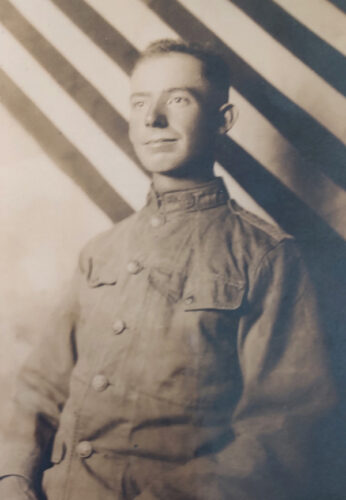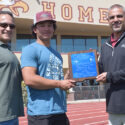Born in Peculiar, Mo., in July 1888, Roscoe Weathers grew up on a farm near Kansas City with his parents, Zachary and Zaidee Weathers; his two brothers, Birdie and Mark; and sisters, Zaidee, Aetna and Nettie.
In 1917, at the age of 28, he joined the U.S. Army. Because he did not weigh enough, he had to go to the induction center three times before he was accepted. Roscoe was determined to serve in “the war to end all wars.”
“The United States entered World War I not only to protect its diplomatic and economic interests, and in the words of President Woodrow Wilson, to “make the world safe for democracy.” More than four million American men and women served during World War I.

Roscoe C. Weathers
submitted photo
Mark, his younger brother, joined with him but caught the highly contagious Spanish flu and spent his entire enlistment in an Army Hospital at Fort Leavenworth.
After boot camp at Camp Funston, Fort Riley, Kan., Roscoe was deployed to France to serve with Gen. “Black Jack” Pershing and the American Expeditionary Force. His deployment began by train at Union Station in Kansas City.
His sister, Zaidee, anxious to see him one more time was determined to see her brother and made her way through the station until she found him, hugged him and kissed him farewell. Zaidee, soon after, contracted the Spanish flu virus and passed away while Roscoe was in France. He learned of her passing by telegram, and remembered the train station and their last farewell.
Since Roscoe volunteered to serve in the infantry, he was somewhat surprised when because he played the trumpet and coronet, he was re-assigned and became an Army musician, joining the U.S. Army band in France. Roscoe was also honored to play military music with Allied Bands lead by John Philip Sousa, the famous U.S. Marine Corps composer who wrote and conducted music in Paris, when the war came to an end on Nov. 11, 1918.
Crossing the English Channel and then the Atlantic Ocean going home he endured choppy waters, having to sleep in a constantly-moving hammock and many sleepless hours. Upon his return to America, he watched as his ship passed by the Statue of Liberty, a symbol of American freedom and enterprise, which proudly greeted him and other returning veterans.
Rosco was honorably discharged from the American Expeditionary Force and the Army’s 103rd Engineers on May 14, 1919.
His mother, Zaidee, was fortunate to have friends to help her on the farm while her boys were serving. Throughout the war, she proudly displayed a flag with two blue stars in her window showing pride in her son’s service to our nation.
After the war, Roscoe and his brother, Mark, who recovered from his illness, worked on the streetcars in Kansas City as brakemen and conductors. Later, he and his brother returned to the family farm, their first love.
As a farmer, Roscoe met the lovely Marietta, who his friends said “that girl is prettier than a speckle-faced pup.” He agreed with their assessment. He and Marietta soon after were married and had a baby girl who they named, Bettie.
Following the Great Depression, Roscoe and Mark decided to separate their interest in the farm. With the proceeds, Roscoe and his wife purchased a 240 acre farm in the Missouri Ozarks, where they lived until Roscoe’s retirement at the age of 80. Roscoe lived to be 86 years old.
His daughter, Bettie Moore and her husband, Thomas, moved to Belen and have lived here 12 years. Bettie and Tom are involved in many service activities in Valencia County, including serving on the board for the Belen Veterans’ Memorial Visitor’s Center, honoring veterans who have served their country, with honorable and selfless dedication.
(Editor’s Note: Each month the Belen Veteran’s Memorial committee selects one veteran from Valencia County to be featured.)
The Valencia County News-Bulletin is a locally owned and operated community newspaper, dedicated to serving Valencia County since 1910 through the highest journalistic and professional business standards. The VCNB is published weekly on Thursdays, including holidays both in print and online.


















